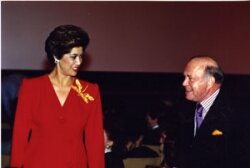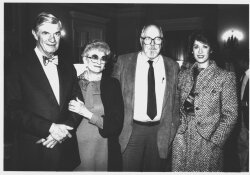Festival origins: Founder Patricia Kluge tells how it all began
-
 Patricia and John Kluge provided cash and contacts in launching what was then the Virginia Festival of American Film.virginia film festival
Patricia and John Kluge provided cash and contacts in launching what was then the Virginia Festival of American Film.virginia film festival -
 "Annie" producer Lewis Allen, "Cabaret" screenwriter Jay Presson Allen, "MASH" director Robert Altman, and Patricia Kluge at an early Virginia Festival of American Film.virginia film festival
"Annie" producer Lewis Allen, "Cabaret" screenwriter Jay Presson Allen, "MASH" director Robert Altman, and Patricia Kluge at an early Virginia Festival of American Film.virginia film festival
On the 25th anniversary of the Virginia Film Festival, Patricia Kluge and former Governor Gerald Baliles both are being honored for its founding. According to Kluge, however, someone else first floated the idea of a film festival in Charlottesville.
"I had Helen Gurley Brown and David Brown at dinner," she recalls, speaking of the legendary Cosmopolitan editor and the legendary producer whose work included Jaws. They were discussing what sort of event would draw people to Charlottesville back in the mid '80s, a time when the Downtown Mall was deserted after 5 o'clock and the town was 20 years away from being named to any kind of best-place-to-live list.
"[David Brown] said a film festival," says Kluge. "I thought, Cannes? He said there were none that only focus on American film."
And he pointed out that with the University of Virginia, there could be academic discussion of film. "He's such a cultured man," says Kluge. "And with Jefferson's university– what a way to showcase it."
Kluge liked the idea of an American film festival, and in fact, for nearly a decade until 1996, it was called the Virginia Festival of American Film. "I think we took over film after World War II as a way of seeing the world," she says. "No one had really looked at film as an American art form."
From that dinner table conversation at historic Morven, the estate where Kluge resided while building Albemarle House, the seed for a film festival in central Virginia was planted.
At that time, Kluge was married to billionaire John Kluge, whom Forbes magazine dubbed the richest man in America in 1987 after he sold his Metromedia television stations to 20th Century Fox, reportedly for $4 billion. Those stations would become the basis for Rupert Murdoch's Fox network.
Patricia Kluge went to Governor Gerald Baliles, who had started the Virginia Film Office in 1980 and who was convinced of the correlation between movie-making and economic development.
"He knew if anyone could bring film people," says Kluge, "we could, because we were in entertainment."
She also went to then-UVA president Robert O'Neil. "We had just given the [Kluge] Children's Rehabilitation Center," she says. "We were good friends of the university."
Even with gubernatorial, presidential, and billionaire backing, says Kluge, there was still resistance from the university. "Old-timers worried about going Hollywood," she says.
The star power was to be balanced by bringing back UVA alums and their films. "That was the premise," says Kluge.
And that paid off with UVA alum/uber-producer Mark Johnson (Breaking Bad, The Notebook, Good Morning Vietnam, Rain Man), who will be commended this year in a proclamation from Governor Bob McDonnell for his 25 years of service to the Festival.
Indeed, those early Virginia Festivals of American Film were glitteringly star-laden. The first in 1988 included Norman Mailer, Jerzy Kosinski, and David Brown.
"They were staying with us," says Kluge. Gregory Peck, Jimmy Stewart, and Robert Mitchum were also among the early luminaries.
Kluge says she rarely made it to see a movie during those first festivals. "I was entertaining people who were sponsors," she recounts. "I had to go to Monticello. I didn't get to the screenings."
Was she ever star-struck at hosting Hollywood legends? "They were all friends," replies Kluge. Except for one.
"The one person I idolized came," confesses Kluge. "I opened my door and she said, 'Oh, Ms. Kluge– ' It was Ann-Margret. I almost fainted. I had idolized her since I was seven years old and saw Viva Las Vegas.
"I was so overwhelmed. She's kind, she's sweet, she's devoted to her husband, and she's still fit. How amazing was that– and I was her hostess?"
By 1995, the Kluges had divorced and Patricia began to focus on wine-making. She reduced and then withdrew her support of the festival, moves that threatened its very existence. It had become the Virginia Film Festival, a move that did not please her.
"I think the opportunity to have a purely American film festival is a great opportunity," she says. "Now, we're like everyone else."
Although some might argue that coming to Charlottesville in the fall for a film festival hosted by the University of Virginia is not quite like everyone else.
Up until the advent of the latest director, Jody Kielbasa, each year of the film festival also had a theme– musicals, the Reel South, Wet– another unique aspect that Kluge says allowed a look at film from many angles. Others felt it was time for the theme to go.
Over the years, says Kluge, the film festival became less about American culture, and more about film making. "In my opinion, it lost its way."
Gerald Baliles moved on to head the Miller Center and this year has launched the Presidency and Film series, which he kicks off with All the President's Men and the two Washington Post reporters who helped to uncover the Watergate scandal, Bob Woodward and Carl Bernstein.
Baliles still touts the value of movies. "Film really became the art medium of the 20th century," he says. "It's had enormous impact on culture."
As for his vision of economic development, in 2011, the Virginia Film Festival brought to Charlottesville $2.3 million in direct sales– for example, the meals eaten in restaurants and hotel rooms booked– and another $1.8 million in indirect sales, which would include the food restaurants bought from wholesalers, according to the Charlottesville Albemarle Convention and Visitors Bureau.
Statewide in 2010, the Virginia Film Office says the motion picture industry brought $344.4 million in direct and indirect sales to the Commonwealth, generated 2,651 jobs and $32.6 million in tax revenue.
Over the years, those involved with the Virginia Film Festival consistently have said that the draw of Charlottesville's festival for stars and filmmakers is the chance to discuss their work in an academic setting.
"Once they were here and actually working with students, it was great," says Kluge.
Kluge, having recently moved to New York, points out one other impact of the festival she began: "Film festivals have sprung up all over. We started the film festival trend."
2 comments
Bet Patsy wish she had that moolah left...
Who are the people in the second photo?